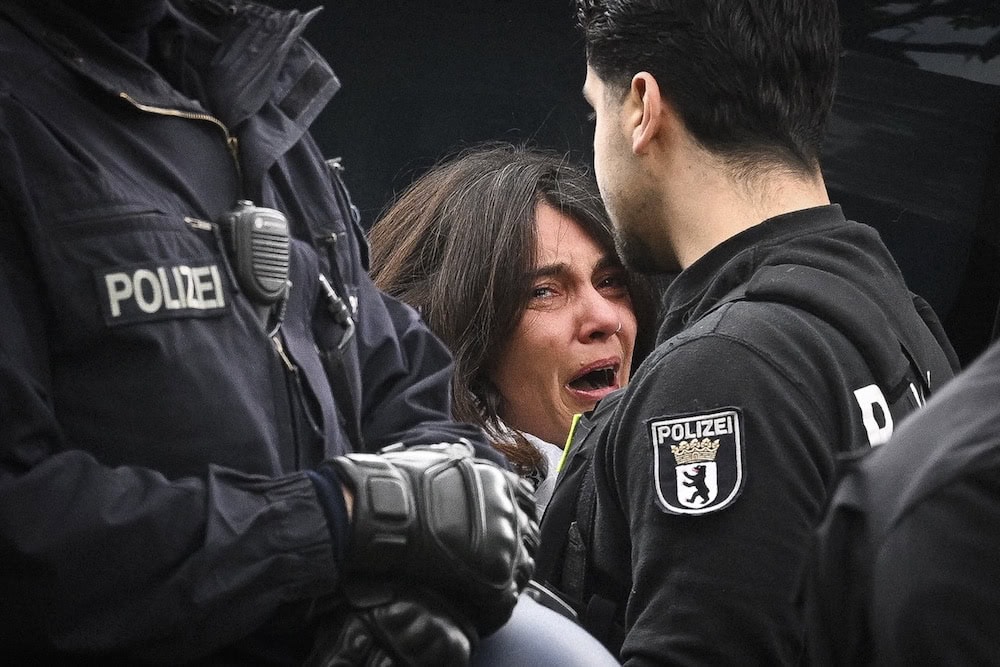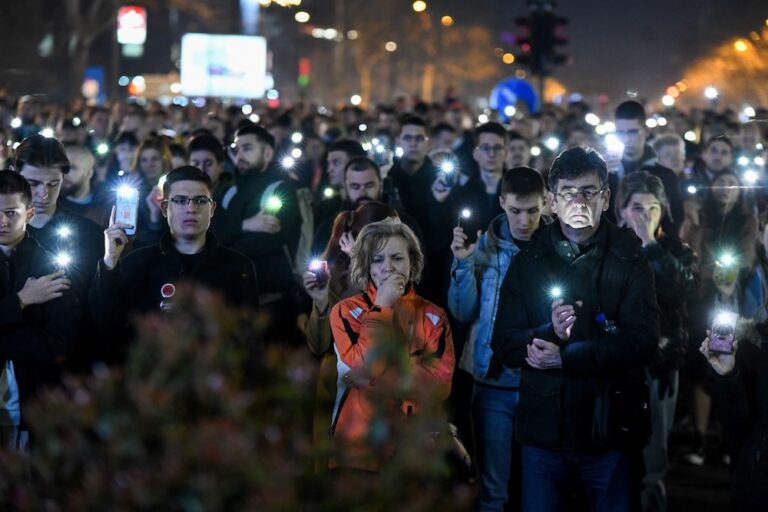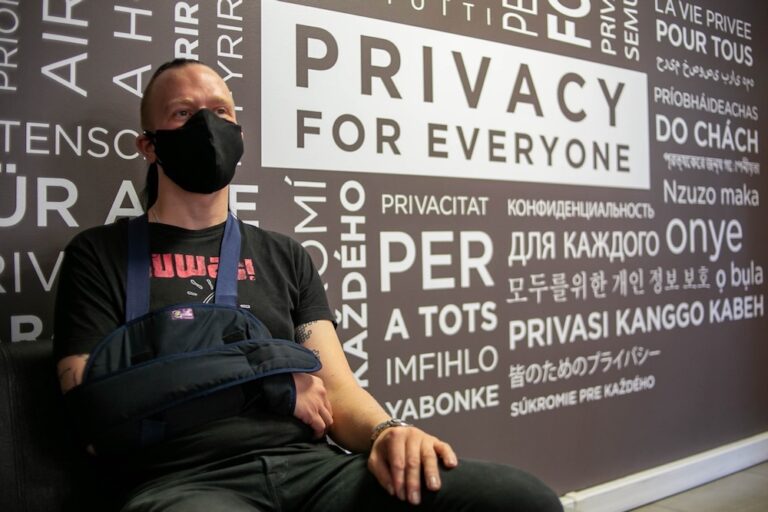April 2024 in Europe and Central Asia: A free expression round-up produced by IFEX's Regional Editor Cathal Sheerin, based on IFEX member reports and news from the region.
“Foreign agents” legislation advances in Georgia and comes into force in Kyrgyzstan; Germany’s ongoing crackdown on pro-Palestinian expression; another welcome step forward in the battle against SLAPPs; and Russia continues to target Navalny associates and anti-war activists.
Following Russia’s bad example
Georgia
In early April, Georgia’s ruling party revived its “foreign agents” bill.
The bill, which has already passed its first reading in parliament (with lawmakers due to vote on a second reading on 30 April), was withdrawn last year following massive street protests. Several theories have been put forward to explain its recent revival: these include allegations of Kremlin influence and accusations that the government wants to incapacitate election observer groups ahead of parliamentary elections in October 2024.
The draft legislation, which is officially known as the bill “On transparency of foreign influence”, has been dubbed the “Russian law” by those who note its resemblance to Russia’s “foreign agents” law. It would smear media outlets and other civil society groups as foreign-controlled if they receive more than 20% of their funding from abroad. Organisations that meet this criteria, and which fail to join a register of such groups, will face fines.
The revival of the bill triggered days of mass protests in the streets of Tbilisi, in which at least four journalists were injured by riot police.
But Georgia’s “foreign agents” bill is not the only law that mimics Russian legislation. In late March, the ruling Georgian Dream party introduced its own version of Russia’s “gay propaganda” law, which, among other restrictions, will prohibit the public promotion of same-sex relationships.
In statements reminiscent of Russia’s President Putin, Georgia’s Prime Minister Irakli Kobakhidze has accused civil society organisations of attempting to launch revolutions, and of promoting “gay propaganda”.
Kyrgyzstan
April also saw President Sadyr Japarov sign into law Kyrgyzstan’s own “foreign agents” legislation. Like its Russian forerunner it will place onerous restrictions on civil society groups that receive foreign funding and engage in so-called “political activities” – seriously undermining both the work and reputations of these organisations.
Mid-month, the Open Society Foundations announced they would close their national foundation in Kyrgyzstan as a result of the new law.
Pro-Palestinian expression hit by shutdowns, smears and deportation
A crisis in civic space
In Europe, attempts to suppress pro-Palestinian speech and protest have been going on for over six months.
A new report by the European Civic Forum, published in early April and covering a six-month period from 7 October 2023, provides a detailed overview of how peaceful acts of solidarity with the Palestinian people (including protests, meetings, cultural activities, and the use of pro-Palestinian images or symbols) have been banned, restricted or otherwise undermined across several EU member states.
According to the European Civic Forum, the period covered by its report saw pre-emptive bans on pro-Palestinian/pro-ceasefire protests in at least 12 EU states: Austria, Bulgaria, Czech Republic, Estonia, Finland, France, Germany, Hungary, Italy, Latvia, Poland and Sweden. “Public order” or “security” concerns were the most common reasons given for such bans, many of which were later overturned in the courts.
The report highlights law enforcement’s use of excessive force in at least seven member states while cracking down on these protests. Examples of excessive force included: the deployment of police dogs, pepper spray, tear gas, physical aggression, kettling tactics and – in one reported case – stun grenades. The use of excessive force was particularly notable in France, Germany, Greece and Italy.
The report also notes how several states – including Austria, Germany and France – conflated legitimate criticism of the policies of the Israeli government with anti-Semitism, a conflation which has contributed to hundreds of cancellations of cultural events, the de-platforming of speakers, activists and intellectuals, and the loss of jobs.
Such a heavy-handed response to the peaceful exercise of the rights to free expression and assembly drew condemnation early on from several human rights groups. In October, when pro-Palestinian protests were breaking out across Europe, ARTICLE 19, Human Rights Watch and PEN International reminded states of their obligation to protect these rights in a functioning democracy.
The German crackdown
Although efforts to silence pro-Palestinian voices in Europe have lost some of their intensity in recent months, in Germany – where official intolerance of pro-Palestinian expression is particularly marked – the shutdowns, arrests and smears continue unabated.
Why is this? Partly, it’s rooted in Germany’s unusual and complex relationship with Israel. As the perpetrator of the Holocaust, Germany has placed its guilt for this almost unimaginable crime at the centre of its national culture. All children are taught about the crimes of their forefathers: never forget, never again is the lesson. Similarly, the German state has made the protection of Israel and Jews its “Staatsräson” (reason of state). Although this notion is not enshrined in law, it functions as state policy: German politicians across all parties recognise this unique, self-imposed obligation.
Unsurprisingly, Germany’s Staatsräson finds expression in the domestic activities of its lawmakers and law enforcers. In 2019, for example, the German Bundestag passed a resolution describing the Boycott, Divestment, Sanctions (BDS) campaign against Israel as anti-Semitic – cutting off funding to any groups that “actively” supported BDS. Some phrases – such as “From the river to the sea, Palestine will be free” – have been criminalised and schools have been given the power to ban Palestinian flags and keffiyehs.
In such a climate, criticism of Israel’s actions is often interpreted as anti-Semitic, and the policing of peaceful events where Israel is criticised frequently goes well beyond over-zealousness, treading on free expression and free assembly rights. April presented us with several examples.
On 12 April, a week after the release of the European Civic Forum report, German police shut down the Palestine Congress in Berlin, where peace activists had gathered to discuss Israel’s war on Gaza. The authorities said they were concerned about anti-Semitic remarks potentially being voiced.
The event had been smeared as anti-Semitic by some media and politicians before it began, and high-profile speakers were barred by police from attending. These included Dr Ghassan Abu-Sittah, Rector of the University of Glasgow and a leading war surgeon who recently worked in Gaza: he was detained by security at the airport after landing in Berlin and deported back to the UK. Later, when a video message from Salman Abu Sitta (Ghassan’s father) was shown at the event, riot police stormed the stage and cut off the power.
Another well-known figure who was also prevented from addressing the Congress was the writer and former finance minister of Greece, Yanis Varoufakis: he was officially banned both from entering Germany and from delivering his speech via video.
While shutting down the Palestine Congress, the police also arrested Udi Raz, a leading member of the Berlin-based civil society organisation Jewish Voice for a Just Peace in the Middle East, which had jointly organised the event.
A week later, in a separate (but not unrelated) incident, the Berlin authorities shut down two service centres run by the queer-feminist association, Frieda Frauenzentrum, which provides support to women (often young and/or migrants) in challenging life circumstances. The notification letter from the authorities cited three reasons for their decision: two board members were allegedly seen at Palestine solidarity vigils “seeking confrontation” with the police; one board member had allegedly “posted various pro-Palestinian statements on her Instagram account, as well as anti-Semitic and anti-Zionist statements against Israel”; the same board member had participated as a speaker at Berlin’s Palestine Congress.
In the final week of April, Berlin police brutally cleared a protest camp – known as ‘Occupy Against Occupation’ – which was set up in front of the German Parliament on 8 April by peace activists calling on Germany to end its arms exports to Israel. Police claimed that the protesters had committed criminal offences, including incitement to hatred and the use of unconstitutional symbols and forbidden slogans. Several examples of police officers using excessive force on non-violent activists were shared on social media.
Belarus: Another birthday behind bars
In Belarus, at least 20 news websites labelled “extremist” by the authorities have had their domain names cancelled, making many of them inaccessible. The Belarusian Association of Journalists (BAJ), which changed its own domain name in 2023 in anticipation of losing its old address, has published a list of affected websites. The Committee to Protect Journalists (CPJ) described “robbing independent media outlets of their domain names” as “a ruthless form of censorship”.
The persecution of independent journalists and those allegedly connected to so-called “extremist organisations” continued: On 5 April, the Stolin District Court handed Aliaksandr Ihnatsiuk, a blogger and former editor of the newspaper Vecherniy Stolin, six years in prison after he was dubiously convicted of organising protests, defaming President Lukashenka and blackmail; on 19 April, the Minsk City Court sentenced Anastasia Matsiash, a language consultant who had worked with the exiled media outlet Belsat TV, to two years in prison for participating in an “extremist organisation”.
Imprisoned opposition leader Maria Kalesnikava saw another birthday behind bars this month. Arrested in September 2020 while anti-Lukashenka protests were sweeping Belarus, Kalesnikava was detained for a year before facing trial. In September 2021, she was convicted of “conspiracy to seize power”, calling for “actions aimed at causing harm to the national security” and creating an “extremist organisation”; she was sentenced to eleven years in prison. Kalesnikava has suffered harsh treatment and ill health in prison. Her family last heard from her in February 2023.
In brief
This month saw another significant step in the battle against one of Europe’s biggest threats to free expression and independent media: on 5 April, the Committee of Ministers approved the Council of Europe’s Recommendation on Strategic Lawsuits Against Public Participation (SLAPPs). This development was warmly welcomed by the Coalition Against SLAPPs in Europe (CASE), which described the Recommendation as providing “a far more robust and detailed set of standards than the EU Directive that will prove crucial during transposition – and will help push non-EU member states to introduce meaningful anti-SLAPP protections of their own”. CASE has published a brief summary of the Recommendation’s strengths and weaknesses here.
In Russia, the authorities continue to persecute activists and journalists who had some association with the late opposition leader, Alexei Navalny. In late April, journalists Konstantin Gabov and Sergey Karelin were arrested on charges of “participating in an extremist group”; they are accused of working with the Navalny foundation and face up to six years in prison if convicted. Late March saw journalists Antonina Favorskaya and Olga Komleva arrested and charged with the same offence; in this case, the charges are linked to their coverage of Navalny’s trial.
Russian anti-war activists continue to find themselves in the crosshairs: on 25 April, 17-year-old Lyubov Lizunova was sentenced to 3.5 years in a youth detention centre for anti-war graffiti and social media posts. She was detained in October 2022, alongside Alexander Snezhkov and Vladislav Vishnevsky, who received six years in prison and 1.5 years in a penal colony respectively. All three were initially accused of painting “Death to the regime” on a garage wall, and later of running an anti-war channel on Telegram. All were convicted on terrorism and/or extremism charges.
On 5 April, anti-war activist Alexander Demidenko died in pre-trial detention. He had helped hundreds of Ukrainians return home from Russia after the war began and was arrested in October 2023. Demidenko was charged with illegal gun possession, but said that he had been tortured into confessing to this crime.



